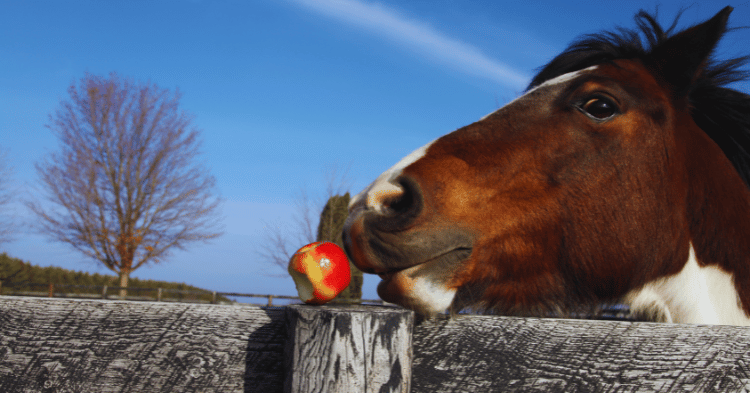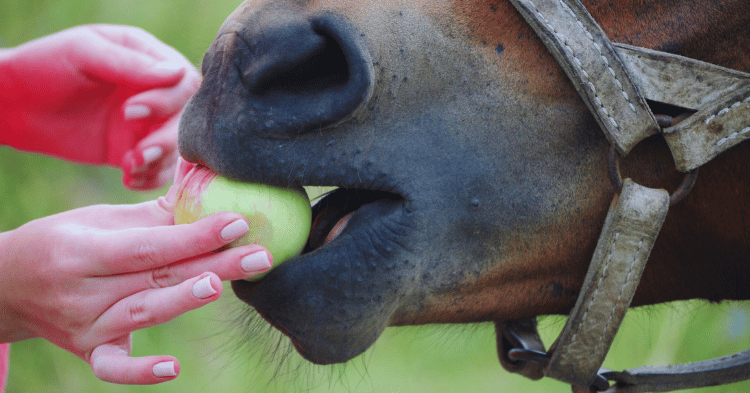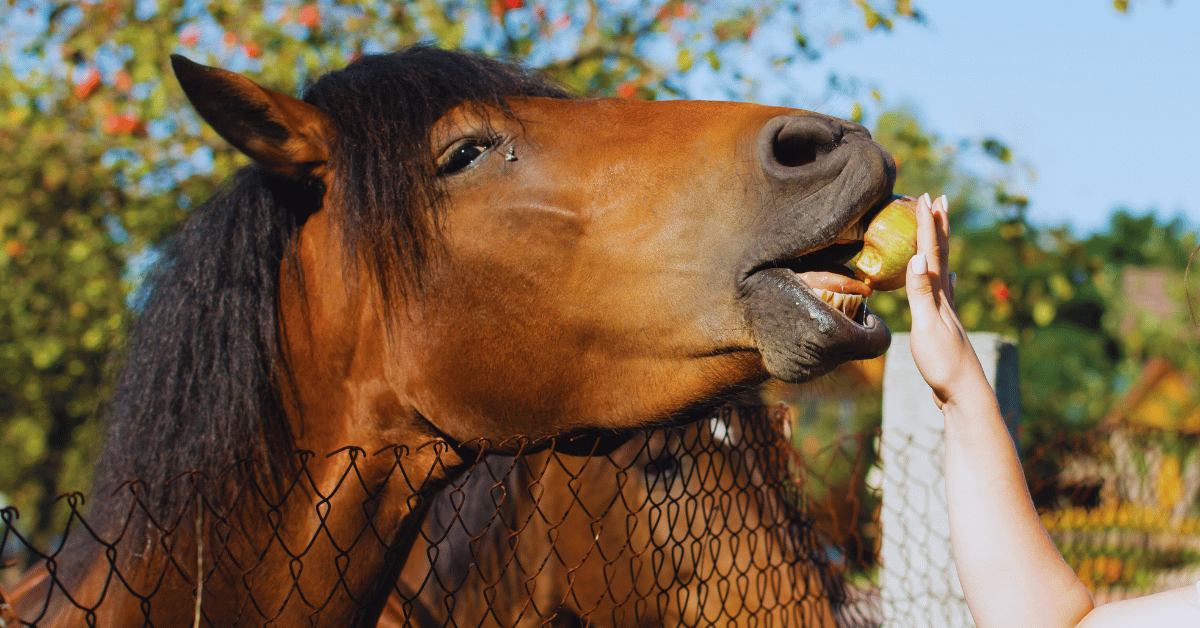Horses and apples—a combination that seems as timeless as a sunny day in the pasture. But before you toss an apple to your equine companion, have you ever paused to wonder, can horses eat apples safely?
While these juicy, crisp treats are undoubtedly delicious, not all human foods suit a horse’s digestive system. Offering apples without understanding the dos and don’ts can lead to unintended risks, including choking or digestive discomfort.
Imagine your horse eagerly munching on a treat, only to face an unexpected health scare. It’s a moment no horse owner wants to experience. Fortunately, with a few simple feeding tips, you can avoid mishaps and provide apples as a healthy, occasional snack.
From slicing them correctly to understanding portion control, this guide ensures your horse enjoys the benefits of apples—like hydration and natural sugars—without any risks. Let’s explore the safest way to treat your horse!
Understanding Horse Nutrition

A thorough understanding of horse nutrition is essential for maintaining a healthy and happy equine companion. Good nutrition ensures that horses receive the necessary nutrients to support their bodily functions, maintain energy levels, and promote overall well-being.
Basic Diet Requirements
Horses require a balanced diet that includes a mix of forage, grains, and occasional treats. The primary component of their diet should be forage, such as grass or hay, which should comprise at least half of their daily intake. According to SPANA, an average adult horse should consume dry matter equivalent to 1.5–3% of its body weight, depending on its activity level and the quality of the feed.
| Nutrient | Requirement |
|---|---|
| Forage (Grass/Hay) | ≥ 50% of diet |
| Dry Matter | 1.5-3% of body weight |
| Grains and Concentrates | As needed based on activity |
| Water | Unlimited access |
In addition to forage, grains and concentrates can be included to provide additional energy, especially for working or highly active horses. Fresh fruits and vegetables can also be part of their diet in moderation. If you’re interested in learning whether other fruits can be part of a horse’s diet, check out our article on can horses eat bananas.
Foraging Behavior
In the wild, horses are natural foragers. They spend a significant amount of their time grazing and searching for food, which is an important behavior to replicate in domesticated settings. According to SPANA, wild horses graze for approximately 15-17 hours per day. They primarily consume grasses, seed heads, shrubs, and other edible plants. They also tend to stay near fresh water sources to ensure they remain hydrated.
To support domesticated horses’ natural foraging behavior, owners can provide access to a variety of forage sources and grazing opportunities. This might include:
- Fresh grass in pastures
- Hay or haylage in stables
- Edible shrubs and branches
Adding variety to a horse’s diet can also support their foraging instincts. For instance, offering fresh vegetable scraps, edible flowers, and leaves can provide enrichment and encourage natural eating habits (Equine Wellness Magazine).
For more details on how to care for and feed your horse, visit our guide on feeding practices for horses.
Understanding the nutritional needs and behavior of horses is essential for their health and well-being. If you have questions about what other fruits are safe for horses, be sure to check our articles on can horses eat watermelon and can horses eat grapes.
Feeding Practices for Horses

Understanding proper feeding practices is essential for maintaining the health and well-being of your horse. This section explores the frequency of feeding and dietary intake guidelines for horses.
Frequency of Feeding
Horses should be fed little and often throughout the day. If kept in a stable, they require two to three feeds per day. It’s crucial not to leave a horse without food for longer than eight hours. This practice helps maintain their health and prevents digestive issues (SPANA).
Horses have small stomachs capable of holding only one to four gallons of food at a time. Therefore, they need small quantities of food multiple times daily. Infrequent feeding can lead to stomach disturbances, diarrhea, colic, and even gastric ulcers, which affect 60% to 90% of mature horses (Equine Wellness Magazine).
Dietary Intake Guidelines
An average adult horse should eat dry matter weighing around 1.5–3% of its body weight. This varies depending on the horse’s activity level and the quality of the feed. At least half of their diet should consist of pasture grass or hay/haylage.
| Horse Weight (lbs) | Dry Matter Intake (lbs) |
|---|---|
| 1000 | 15 – 30 |
| 1200 | 18 – 36 |
| 1400 | 21 – 42 |
Horses should avoid large amounts of grain. In the wild, horses find grain in small, scattered amounts, particularly before winter when they need more calories. Consuming a lot of grain can cause vices, colic, ulcers, and high insulin levels. Grain should not be the primary source of nutrition for horses.
Providing free access to pasture or grass hay and limiting grain and concentrated processed feeds can reduce the risk of ulcer disease and establish a more natural feeding pattern. For more detailed information about horse nutrition, visit our articles on can horses eat bananas, can horses eat watermelon, and can horses eat grapes.
Can Horses Eat Apples?
Safety of Feeding Apples
Many horse owners wonder, “Can horses eat apples?” The answer is yes, most horses can safely enjoy apples as an occasional snack. Apples, in all colors and varieties, including crab apples and fresh windfall apples, can be a delightful treat for equines.
However, there are some safety considerations to keep in mind:
- Apple Seeds: Although apple seeds contain a cyanide-based compound, the amounts are very small. A horse would need to consume about a cup of seeds to be harmed. So, if your horse eats a few seeds, there is no need to worry (PetMD).
- Apple Cores: Apple cores can be tough to swallow and may pose a choking hazard, particularly for foals and senior horses. It’s best to discard the cores and cut the apples into slices for safer consumption (PetMD).
Considerations Before Feeding
Before incorporating apples into your horse’s diet, consider the following points to ensure their health and wellbeing:
Moderation: Apples should only make up a small portion of a horse’s daily calorie intake. Most horses should eat no more than one or two average-sized apples per day to avoid upsetting their digestive system. For horses with metabolic disorders such as Cushing’s disease, consult a veterinarian before feeding apples.
Choking Hazards: To reduce the risk of choking, always slice apples into smaller pieces. This is especially important for younger and older horses who may have difficulty chewing larger chunks.
Sugar Content: Apples have a significant sugar content, which can pose risks if consumed in large amounts. Always feed apples in moderation, particularly to horses with metabolic disorders. Excessive apple consumption can lead to health issues (Equine Institute).
Gradual Diet Changes: Avoid rapid changes to a horse’s diet to prevent illnesses like colic. Any dietary changes should be introduced gradually over two to four weeks.
Consultation: If you have concerns about your horse’s diet, always consult a veterinarian. This is particularly important for horses with existing health conditions or specific dietary restrictions.
For more information on horse nutrition and feeding practices, you can explore our articles on can horses eat bananas, can horses eat watermelon, and can horses eat pears.
| Aspect | Recommendation |
|---|---|
| Maximum Apples per Day | 1 – 2 |
| Feeding Method | Sliced, discard cores |
| Key Risks | Choking, excessive sugar |
| Suitable Horses | Most healthy horses |
Benefits and Risks of Apple Consumption
Understanding the benefits and potential risks of feeding apples to horses is essential for every horse owner. Here’s a detailed look into the nutritional benefits of apples and the considerations for feeding them in moderation.
Nutritional Benefits of Apples
Apples are packed with essential nutrients that can significantly benefit a horse’s health.
| Nutrient | Benefit |
|---|---|
| Vitamin A | Supports immune function and healthy vision |
| Vitamin C | Enhances immune system function |
| Fiber | Aids in digestion and gut health |
| Antioxidants (Quercetin) | Reduces inflammation and combats oxidative stress |
Apples are a rich source of vitamins A and C, both crucial for immune function and maintaining healthy vision (Equine Institute). The dietary fiber in apples aids in digestion, promoting a healthy gut. Additionally, antioxidants like quercetin help in reducing inflammation and oxidative stress, which is particularly beneficial for active or aging horses.
Risks and Moderation
While apples provide several health benefits, feeding them in moderation is key to preventing potential risks.
| Risk | Concern |
|---|---|
| High Sugar Content | Can pose risks for horses with metabolic disorders |
| Metabolic Disorders (PPID) | Conditions like Cushing’s disease require avoiding sugary treats |
| Over-Consumption | Excessive consumption can lead to digestive issues such as colic or diarrhea |
The sugar content in apples provides a quick source of energy but can be problematic if consumed in excess, especially for horses with metabolic disorders. Horses with conditions like PPID (Cushing’s disease) should avoid sugary treats such as apples. Over-consumption can also result in digestive issues including colic or diarrhea.
For more information on other safe treats for horses, you can explore our articles like can horses eat bananas and can horses eat watermelon.
Feeding apples to horses can be beneficial, but understanding the balance is crucial. Ensuring that they are given in moderation can help maintain your horse’s overall health.

